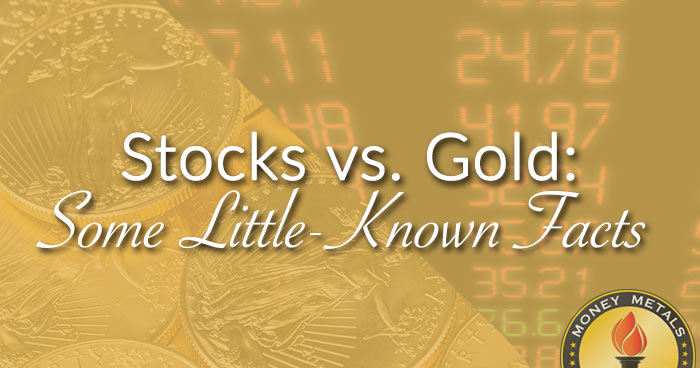The gold and silver markets rarely get much love on Wall Street and from the average investors who only listen attentively to what CNBC and stock brokers have to say.
Nearly a decade of underperformance in the metals markets certainly isn’t helping draw attention. Recently, the gold market started to move, and the rising price has thus far gone mostly unnoticed.
Everyone is watching the equity markets continue the surge higher that began the day after Christmas.
Investors who wonder how long the stock markets will continue to outperform gold ought to consider these little-known facts. They won’t be hearing them on TV or from their broker until after it is too late.
Gold Recently Began to Outperform Stocks
The equity markets just finished their best June in 80 years. That has been trumpeted everywhere in the financial press. The Dow Jones Industrial Average gained 7.2% for the month. That’s hard to beat, but at least one unloved asset managed to do it. Gold gained 8% in June.
It’s worth pointing out that gold has also dramatically outperformed gold in the longer term. The metal has roughly quadrupled in value since Jan. 1, 2000, when it traded at $285/oz. Compare that to the S&P 500 which is just slightly more than double its value at 1426 as we began the new century.
Yes, gold has had trouble relative to stocks if you only consider the past decade. But there is good reason to think the next decade will be very different indeed.
Central Banks Are Losing Control
One of the reasons gold performed so well in June is that the Fed is abandoning their plan to raise interest rates and most watchers now expect officials to begin lowering again at the end of this month.
Officials cut rates to zero to spur growth. The move certainly worked wonders to drive stock prices, but it didn’t do much to build lasting economic strength.
Share prices began collapsing late last year when it appeared the stimulus would be withdrawn.

Investors should be asking why, if the economy is so strong, is the Fed getting ready to change course and start cutting rates. After all, the idea was that officials should step on the gas (lower rates) when the economy is weak, and hit the brakes (raise rates) when the economy recovers.
Instead of viewing interest rate policy as a set of car pedals, FOMC officials should have looked at it like a dangerous drug. The financial markets are now hopelessly addicted to cheap money.
Spineless Fed bankers now only see one real option, where they had planned to have two.
They will try to keep rates artificially low – most likely until the nation overdoses on debt.
Stock Prices are Rising on Declining Volume While Gold Prices Are Rising on Increasing Volume
Fewer investors are inclined to buy shares, though they have not yet decided to sell. Among the players still inclined to buy are Central Banks which granted themselves a mandate to intervene anywhere and everywhere they see fit following the 2008 financial crisis.

The current rally in stocks may well be driven by the combination of officials promising to lower rates and instructing their internal trading desks to buy shares whenever there is even a whiff of trouble.
We can’t say for certain this is the case because central banks are the opposite of open and accountable. However, this amount of strength in share prices coupled with extraordinarily low volume sure smells fishy.
Many investors have concluded the Fed and other central banks are propping up the equity markets and they are determined not to sell. However, as mentioned above, central bankers appear to be losing control.
Now might be a good time to prepare for the day when all control is lost, rather than waiting until after. Given the rising trading volume in gold, perhaps that is exactly what some people are doing.

About the Author:
Clint Siegner is a Director at Money Metals Exchange, a precious metals dealer recently named "Best in the USA" by an independent global ratings group. A graduate of Linfield College in Oregon, Siegner puts his experience in business management along with his passion for personal liberty, limited government, and honest money into the development of Money Metals' brand and reach. This includes writing extensively on the bullion markets and their intersection with policy and world affairs.





